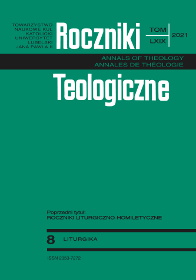The Liturgical Offering of Boredom
Abstrakt
Znudzenie podczas ofiary liturgicznej
Czy istnieje coś takiego jak nudny rytuał, czy raczej nuda jest afektywnym przeżyciem podmiotu? W artykule autor stawia tezę, że nic – łącznie z posoborowymi obrzędami Kościoła – nie może być z natury nudne. Nuda – lub wyraźniej poddanie się nudzie – jest duchową chorobą późnej nowoczesności. Artykuł wychodzi od analizy zjawiska nudy, ze szczególnym uwzględnieniem nudy w jakiejś cyfrowej ekologii. Następnie zwrócono uwagę na symptomy nudy badane przez teoretyków społecznych i kulturowych w ciągu ostatniej dekady, w tym Zygmunta Baumana, Harmuta Rosę i Byung-Chul Hana. Na koniec poddano analizie Ducha liturgii Romano Guardiniego jako dającej lekarstwo na pewien rodzaj antyświątecznej kultury, która jest źródłem nudy w późnej nowoczesności. Nuda nie jest problemem związanym z obrzędem, ale ze świadomością samego człowieka, który nie nauczył się jeszcze uczestniczyć w autentycznej radości aktu kultu.
Bibliografia
Bauman, Zygmunt. Liquid Love: On the Frailty of Human Bonds. Malden, MA: Polity Press, 2003.
Bauman, Zygmunt. Liquid Times: Living in an Age of Uncertainty. Malden, MA: Polity Press, 2007.
Bauman, Zygmunt. The Art of Life. Malden, MA: Polity Press, 2008.
Bullivant, Stephen. Mass Exodus: Catholic Disaffiliation in Britain and American since Vatican II. New York: Oxford University Press, 2019.
Carr, Nicholas. The Shallows: What the Internet Is Doing to Our Brains. New York: W.W. Norton & Company, 2011.
Csikszentmihalyi, Mihaly. Beyond Boredom and Anxiety: Experiencing Flow in Work and Play. San Francisco: Jossey Bass, 1975.
Guardini Romano. Letters from Lake Como: Explorations in Technology and the Human Race. Grand Rapids, MI: Eerdmans, 1994.
Guardini, Romano. Sacred Signs, trans. Grace Branham. St. Louis: Pio Decimo Press, 1956.
Guardini, Romano. The Spirit of the Liturgy, trans. Ada Lane. New York: Crossroads, 1998.
Han, Byung-Chul. The Burnout Society, trans. Erik Butler. Stanford: University of Stanford Press, 2015.
Han, Byung-Chul. The Disappearance of Rituals, trans. Daniel Steuer. Malden, MA: Polity Press, 2020.
Kwasniewski, Peter. Reclaiming Our Roman Catholic Birthright: The Genius and Timeliness of the Traditional Latin Mass. Brooklyn, NY: Angelico Press, 2020.
Lacoste, Jean-Yves. Experience and the Absolute: Disputed Questions on the Humanity of Man, trans. Mark Raftery-Skehan. New York: Fordham University Press, 2004.
Lombardo, Nicholas E. “Boredom and Modern Culture.” Logos 20.2(2017): 36-59.
O'Malley, Timothy P. “Liturgical Memory and Liquid Modernity.” Antiphon 22(2018): 121-137.
O'Malley, Timothy P. Bored Again Catholic: How the Mass Could Save Your Life. Huntington, IN: Our Sunday Visitor, 2017.
Pieper, Josef. In Tune with the World: A Theory of Festivity. South Bend, IN: St. Augustine's Press, 1999.
Raposa, Michael L. Boredom and the Religious Imagination. Charlottesville, VA: University of Virginia Press, 1999.
Rosa, Hartmut. Resonance: A Sociology of Our Relationship to the World, trans. James C. Wagner. Malden, MA: Polity Press, 2020.
Rosa, Hartmut. Social Acceleration: A New Theory of Modernity, trans. Hartmut Rosa. New York: Columbia University Press, 2015.
Rosa, Hartmut. The Uncontrollability of the World, trans. James C. Wagner. Malden, MA: Polity, 2020.
Teresa of Avila. The Way of Perfection, trans. Kieran Kavanaugh and Otilio Rodriquez. Washington D.C.: Institute for Carmelite Studies, 2000.
Toohey, Peter. Boredom: A Lively History. New Haven: Yale University Press, 2011.
Zuboff, Shoshana. The Age of Surveillance Capitalism: The Fight for a Human Future at the New Frontiers of Power. New York: Public Affairs, 2019.
Copyright (c) 2021 Roczniki Teologiczne

Utwór dostępny jest na licencji Creative Commons Uznanie autorstwa – Użycie niekomercyjne – Bez utworów zależnych 4.0 Międzynarodowe.





